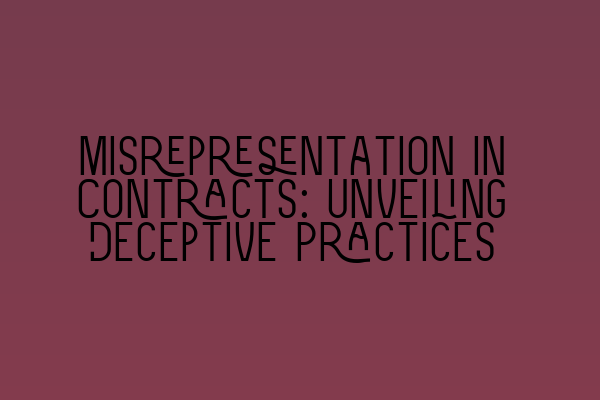Misrepresentation in Contracts: Unveiling Deceptive Practices
In contract law, misrepresentation is a serious issue that can have significant consequences for all parties involved. It occurs when one party makes a false statement of fact that influences the decision of the other party to enter into a contract. Misrepresentation can lead to financial loss, damaged reputations, and lengthy legal battles. Therefore, it is crucial for solicitors and individuals alike to understand the different types of misrepresentation and how to effectively deal with them.
Types of Misrepresentation
There are three main types of misrepresentation: innocent misrepresentation, negligent misrepresentation, and fraudulent misrepresentation.
1. Innocent Misrepresentation: Innocent misrepresentation occurs when a party makes a false statement honestly believing it to be true, without any intention to deceive. Although innocent misrepresentation may not involve any fraudulent intent, it can still give rise to a claim for damages or even the right to rescind the contract.
2. Negligent Misrepresentation: Negligent misrepresentation occurs when a party makes a false statement without reasonable grounds for believing it to be true. Unlike innocent misrepresentation, negligent misrepresentation involves a lack of due care and can result in significant legal consequences.
3. Fraudulent Misrepresentation: Fraudulent misrepresentation occurs when a party makes a false statement with the intention to deceive the other party. Fraudulent misrepresentation is a serious offense and can lead to criminal charges in addition to civil liability.
The Impact of Misrepresentation
Misrepresentation can have far-reaching effects on both parties involved in a contract. The deceived party may suffer financial loss, reputational damage, and a breach of trust. It can also lead to disagreements, strained relationships, and the breakdown of future business opportunities.
For solicitors, misrepresentation cases can be complex and time-consuming. They require a thorough understanding of contract law, the ability to gather evidence, and strong negotiation skills to protect the interests of their clients.
Identifying Misrepresentation
Identifying misrepresentation can be challenging, as false statements may be subtle or disguised as opinions. It is essential to analyze the circumstances surrounding the statement and assess whether it can reasonably be relied upon.
When investigating misrepresentation claims, solicitors often examine documents, interview witnesses, and seek expert opinions to gather evidence. They must carefully evaluate the evidence to determine its admissibility in court and build a compelling case.
Dealing with Misrepresentation
If misrepresentation is discovered, the innocent party has several options to pursue:
1. Rescission: Rescission allows the innocent party to set aside the contract and be placed in the position they were in before entering into the agreement. Rescission is often the preferred option for innocent misrepresentation cases.
2. Damages: The innocent party may also seek damages to compensate for any financial loss incurred as a result of the misrepresentation. Damages can include both direct losses and any indirect losses that flowed naturally from the misrepresentation.
3. Termination: In some cases, the innocent party may choose to terminate the contract altogether if the misrepresentation was fundamental to the agreement.
The Role of Solicitors in Misrepresentation Cases
Solicitors play a vital role in misrepresentation cases, representing either the innocent party seeking redress or the party accused of misrepresentation. They act as legal advisors, guiding their clients through the complex legal process and advocating for their best interests.
Effective negotiation skills, attention to detail, and a deep understanding of contract law are essential attributes for solicitors handling misrepresentation cases. They must strive to gather compelling evidence, develop persuasive arguments, and protect their client’s rights.
Conclusion
Misrepresentation in contracts is a pervasive issue that can have severe consequences for all parties involved. Whether innocent, negligent, or fraudulent, misrepresentation can lead to financial loss and damaged relationships. By understanding the different types of misrepresentation, identifying deceptive practices, and seeking the assistance of experienced solicitors, individuals can protect themselves and their interests in contract agreements.
Related Articles:
- Barrister vs. Solicitor: A Comprehensive Comparison
- Embracing the Rise of Virtual Law Practices
- Unveiling Real-Life Case Studies: Insights into Legal Practice and Decision-Making
- Exploring Solicitor Salaries in the UK: Average Earnings and Factors Affecting Income
- Mastering Client Relationship Management: Skills for Solicitors to Enhance Trust and Loyalty
